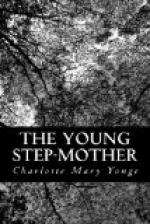Mr. Kendal’s letter to Gilbert was an absolute apology. Gilbert in Turkey was a very different person from Gilbert at Bayford, and had assumed in his father’s mind the natural rights of son and heir; he seemed happy and valued, and the heat of the climate, pestiferous to so many, seemed but to give his Indian constitution the vigour it needed. When his comrades were laid up, or going away for better air, much duty was falling on him, and he was doing it with hearty good-will and effectiveness. Already the rapid changes had made him a lieutenant, and he wrote in the highest spirits. Moreover, he had fallen in with Bryan O’More, and had been able to do him sundry kindnesses, the report of which brought Ulick to Willow Lawn in an overflow of gratitude.
It was a strange state of affairs there. Albinia was ashamed of the plea of ‘could not help it,’ and yet that was the only one to rest on; the adherence to promises alone gave a sense of duty, and when or how the promises had been given was not clear.
Besides, no one could be certain even about poor Lucy’s present satisfaction; she sometimes seemed like a little bird fluttering under the fascination of a snake. She was evidently half afraid of Algernon, and would breathe more freely when he was not at hand; but then a restlessness would come on if he did not appear as soon as she expected, as if she dreaded having offended him. She had violent bursts of remorseful tears, and great outpourings of fondness towards every one at home, and she positively did look ill enough to justify Algernon in saying that the present condition of matters was hurtful to her. Still she could not endure a word that remotely tended towards advising her to break off the engagement, or even to retard the wedding, and her admiration of her intended was unabated.
Indeed, his affection could not be doubted; he liked her adoration of all his performances, and he regarded her with beneficent protection, as a piece of property; he made her magnificent presents, and conceded to her that the wedding tour should not be beyond Clifton, whence they would return to Willow Lawn, and judge ere deciding on going abroad.
He said that it would be ‘de bon ton’ to have the marriage strictly private. Even he saw the incongruity of festivity alongside of that chamber of decay and death; and besides, he had conceived such a distaste to the Drury family, that he had signified to Lucy that they must not make part of the spectacle.
Albinia and Sophy thought this so impertinent, that they manfully fought the battles of the Drurys, but without prevailing; Albinia took her revenge, by observing that this being the case, it was impossible to ask her brother and little Mary, whose well-sounding names she knew Algernon ambitionated for the benefit of the county paper.
Always doing what was most contrary to the theories with which she started in life, Albinia found herself taking the middle course that she contemned. She was marrying her first daughter with an aching, foreboding heart, unable either to approve or to prevent, and obliged to console and cheer just when she would have imagined herself insisting upon a rupture at all costs.




